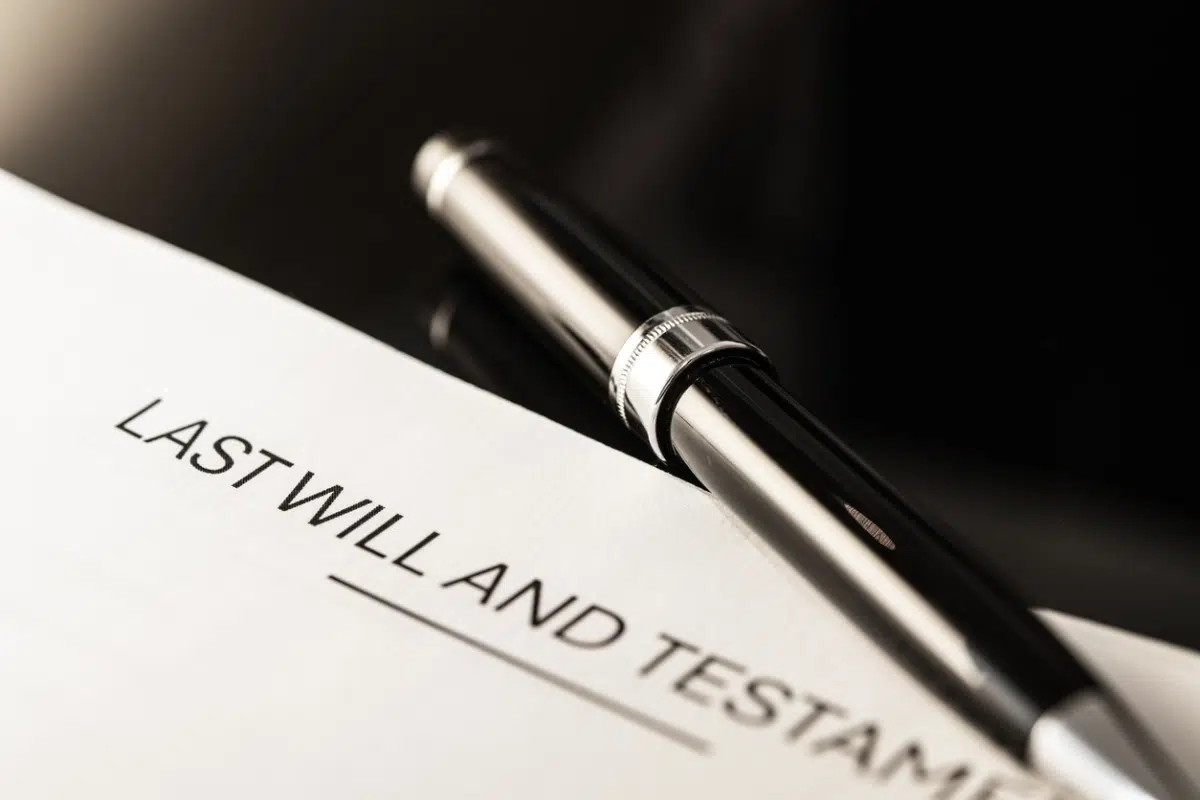If you believe your status as a beneficiary has been violated, consulting an experienced estate attorney and probate attorney is essential. Contesting a will is a complex legal process requiring probate litigation. Here, we’ll explore what it means to contest a will, the process for doing so, and who is eligible to file a contest in Arizona.
What is a Contested Will?
A will is a legal document laying out the decedent’s final wishes. If an interested party, such as the beneficiaries, challenges the will during the probate process, the will is contested. Before the probate court can authorize a personal representative to administer the decedent’s estate, it must first verify the validity of the will. During this process, any eligible party can raise challenges; such as the decedent’s lack of mental capacity or claim there was undue influence or fraud.
An interested party may challenge specific provisions within a will, the validity of the entire document, or the way it was executed. Valid grounds for contesting a will are:
- Lack of Testamentary Capacity: Whether the testator (the person making the will) was of sound mind necessary to create a valid will.
- Undue Influence: Concerns that the decedent may have been coerced into creating or altering their will.
- Improper Execution: Issues with how the will was signed or witnessed, may render the document invalid.
- Fraud: Claims that the will was created or modified under fraudulent circumstances.
How to Contest a Will in Arizona
If you intend to contest a will in Arizona, you must file a formal petition with the probate court where the will is being probated. This petition must state your reasons for challenging the will’s validity and any supporting evidence. The probate court will require you to notify other beneficiaries, family members, and other relevant parties.
The court will hold a hearing to determine whether there is a valid will and evaluate the legal arguments presented by all parties. If the judge deems the will invalid based on undue influence, fraud, or incapacity, the estate will be governed according to a prior will or intestacy laws.
Who Can Contest a Will in Arizona?
Legal standing is crucial in contesting a will, meaning only certain parties can challenge it. The following individuals usually have the standing to initiate a will contest:
- Beneficiaries of a Prior Will: If you were named as a beneficiary in an earlier version of the will being offered to probate, you generally have the ability to contest the current will.
- Beneficiaries of a Newer Will: If a later will exists and names you as a beneficiary, you may have the right to contest a prior will on the grounds that the newer will supersede it.
- Heirs Under Intestacy Laws: If the proffered will disinherit the decedent’s heirs under Arizona’s intestacy laws, they have standing to challenge the will in an effort to set it aside. Spouses, children, and other direct family members, like siblings or parents, generally have the standing to challenge a will.
When Can You Challenge a Will in Arizona?
Under Arizona law, individuals may challenge the validity of a will if there are concerns about undue influence, fraud, lack of testamentary capacity, or other irregularities. Contesting a will is a significant legal matter that involves estate litigation and requires the assistance of a qualified will contest attorney. Below, we’ll outline the main reasons for contesting a will and the process involved.
- Failure to Comply with Arizona Law: Arizona law specifies certain formalities for a valid will. For example, a handwritten will, or holographic will, must be entirely in the testator’s handwriting, dated, include testamentary language, and be signed by the testator. If these requirements aren’t met, the validity of the will may be challenged with the assistance of an experienced estate litigation lawyer.
- Lack of Testamentary Capacity: To create a valid will, the testator must understand the natural beneficiaries of their estate (such as family members or loved ones), their assets (such as real estate, brokerage accounts, tangible personal property, etc), and the implications of making a last will. If the testator lacked mental capacity, the will might not hold up in the probate court.
- Undue Influence: When a testator is manipulated or a fiduciary duty is abused, the will may not represent the testator’s intentions. Undue influence is grounds for a will dispute.
- Misconduct Involving a Vulnerable or Incapacitated Adult: Arizona law protects vulnerable adults from coercion and exploitation. If a loved one suspects that a deceased person was manipulated due to incapacity or dependency, a will dispute may arise.
- Statutory Disqualification of a Beneficiary: Arizona’s slayer statute automatically disqualifies a person who has intentionally caused the death of the decedent from inheriting under the will.
- Forgery and Coercion: Forgery involves falsifying the testator’s signature or modifying the document. Coercion, on the other hand, includes threats or intimidation to influence the testator into signing a document they would not have otherwise signed. Both are grounds for contesting a will’s validity.
- Multiple Wills: A testator may create multiple wills over time. Each new one will generally revoke the prior one. Estate litigation attorneys can assist in determining which document is the decedent’s last will & testament and resolve conflicts among family members or other interested parties.
- Ambiguity in Terms: If a will’s language is vague or unclear, beneficiaries may interpret its terms differently. An experienced will dispute attorney can help clarify these terms by consulting with estate planning professionals to ensure the decedent’s intentions are respected.
- Failure to Account for All Assets: If a will fails to address certain assets, such as newly acquired real estate, beneficiaries need guidance on who gets what. Often, a residuary clause can prevent these issues, but its absence may lead to a probate dispute.
- Disinheriting a Current Spouse: Under Arizona’s community property laws, a surviving spouse may have a legal claim to a portion of the decedent’s estate, even if disinherited by the will. Disputes may arise if the will fails to account for this, and a probate lawyer can guide family members through this complex legal matter.
Importance of a No-Contest Clause
Many will include a no-contest clause to discourage beneficiaries from challenging the will. A no-contest clause can mean that if a beneficiary challenges the will and loses, they risk being disinherited altogether. However, if a valid reason exists for the will contest, Arizona probate courts may allow it to proceed without invoking the clause. As such, no contest clauses are toothless unless the potential contestant has something to lose.
Legal Process and Evidence for Contesting a Will
If you decide to contest a will, working with a will-contest attorney can help you navigate the complex legal process. Key evidence types vary depending on the reason for the contest:
- Lack of Testamentary Capacity:
- Medical records and professional mental health assessments
- Statements from medical experts confirming mental capacity concerns
- Witnesses who can speak to the testator’s mental state when signing the will
- Undue Influence or Coercion:
- Testimony from family members, friends, or legal counsel
- Documentation showing a sudden shift in the will’s terms
- Evidence of the testator’s isolation or influence by a specific person (did they also sign a power of attorney which the bad actor abused?)
- Forgery:
- Verified handwriting samples from the decedent
- Handwriting expert testimony
- Forensic evidence indicating forgery or document alteration
Contact Our Law Firm
Our Arizona-based law firm has years of experience in estate planning, estate administration, and will disputes. We understand the intricacies of estate litigation and work with medical experts, neuropsychologists, and forensic analysts to provide clients with comprehensive support. Our attorneys can review evidence, prepare for probate court hearings, and help you understand your options.
If you suspect that a will or trust was created under improper circumstances, contact our law firm for a consultation. By working with an experienced will contest lawyer, you can explore your options and receive essential legal advice. For more information, please reach out to our office or submit an inquiry through our contact form.
Disclaimer – This article is written for informational purposes only and does not form an attorney-client relationship.




